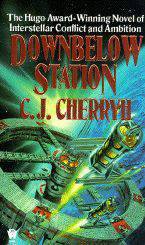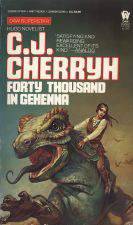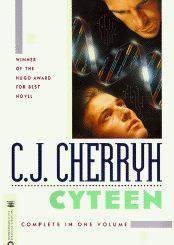

| Note: C. J. Cherryh has her own Web page. | ||
| Click on a book's image or title to order from Amazon.com |

Downbelow Station
DAW, © 1981, 432 pp, ISBN #0-87997-594-6Reviewed April 1997
Downbelow Station chronicles the formative moment of the Merchanters' Alliance in her Alliance/Union future history milieu. The Earth Company had controlled mankind's advancement into the stars for centuries, but eventually the people who migrated offworld became tired of the Company's domineering hand and founded the Union as a counterpoint. The Company retaliated with the Fleet, but soon found itself on the losing end of a long, slow war, a war in which the governments of Earth did not wish to be involved.
Downbelow Station mostly takes place at Pell's Star, and the station of the book's title is a nominally neutral location in the war, albeit also nominally in support of the Company Fleet. The novel takes place when the Company sends a mission to sue for peace with Union, even as the independent Fleet takes its own steps to end the war, by taking a scorched-earth policy on other, less important stations - a policy that results in Pell accepting thousands of traumatized and desperate refugees.
The book is essentially grand space opera as seen from a space station, with all of the claustrophobic atmosphere that such a setting implies. Pell finds itself caught between the Fleet and its commander, Conrad Mazian, who decides to take over Pell for himself, defending it until he can lure Union to a larger trap at Sol, and the encroaching Union fleet, bent on conquest. The hundreds of merchant vessels serving Pell, the Union capital Cyteen, and many other stations, are so trapped themselves.
Cherryh has a clear writing style, although it is fairly simple in style. Her tapestry of characters often seem to be seen only from a distance, as the mechanics of plot and counter-plot are more important here. Cherryh's plotting, though, is impeccable, as it involves internecine struggles on the station, and the various larger strategies pursued by the larger players.
The novel unfortunately seems to wrap itself up all too quickly (despite its length), as the newly-formed Alliance moves in to effectively save the day and claim Pell for its own, and the novel ends with the Alliance only barely born, and the fate of Mazian and the fleet untold. (Cherryh's novel Cyteen has a similarly-frantic, seemingly-rushed ending.) As I've so far only read Cherryh's two Union novels, I don't have a good feel for the Alliance (who the Union largely regard as dullards), and thus much of Cherryh's future history remains opaque to me so far.
Fans of meticulously-plotted space opera, and of complex future histories, will likely enjoy this novel. For myself, although it is entertaining I think it bites off more than it can chew, and is ultimately frustrating for its weaknesses, as much as it is exciting for its strengths.

Forty Thousand in Gehenna
DAW, © 1983, 445 pp, ISBN #0-88677-429-2Reviewed March 1997
In this novel, the Union, one of Cherryh's starfaring nations in her future universe, sends forty thousand people - most of them azi (clones) - to populate the planet Gehenna. Gehenna is one of several habitable worlds close to the territory of the other major power, the Merchanters' Alliance. Knowing that eventually the Alliance will discover and colonize Gehenna, the Union abandons its colony there on the theory that the colony will evolve with some slight Unionist tendencies and make the world harder for the Alliance to colonize. (This point is made more explicitly in Cherryh's later Union novel, Cyteen.) The plot works, but not in quite the way intended.
In a broader sense, Forty Thousand in Gehenna is about how the abandoned colony adapts to life on an alien world, populated by large lizard-beasts named Calibans who turn out to have a degree of intelligence and perhaps sentience, but who behave in a manner very alien to our own. Eventually the two species develops a symbiotic relationship, and eventually the Alliance does arrive on Gehenna, to observe the new human culture there.
The first half of the novel deals with the colony's fall from grace, as successive generations are raised in the presence of Calibans and their smaller counterparts, the Ariels, and behave in ever-more-eccentric manners from their elders' point of view. The sequence is chilling in part because it is told primarily from the point of view of the colony's first commander, James Conn, who is suffering a profound depression following the death of his wife, and of an azi, Jin, who was raised through the use of tapes and whose personality is already somewhat alien to those of 'born-men'. However, the distance that these points of view impose on the story give the prose a rather dry feel, and many events and concepts are glossed over in the early going.
The second half of the novel deals directly with the lives of two women: Elai, the ruler of one of Gehenna's two "native" societies, and Elizabeth McGee, an Alliance scientist who befriends Elai even as she studies their culture. The flashpoint of the novel involves McGee's education in Gehennan nature, and the conflict between Elai's Cloudside populace and their rival Styxsiders (both groups named for the rivers along which they live).
The most interesting notion in Forty Thousand is the Caliban culture: The most advanced Calibans are original thinkers, and communicate using patterns of rock and sand (notions and gestures which are incorporated by humans for communication with Calibans and among themselves). The lesser Calibans and the Ariels mimic these patterns over a wider and wider region, thus slowly conveying information over dozens of miles. In a sense, then, the Gehennans are a sort of living computer, which gives an interesting flavor to their near-stone-age culture.
But the novel is short on character and the plot is somewhat thin. We never get a good feel for who any of the characters are, or what they want or what drives them, except in the simplest manners. It seemed to me that much of the first half could have been worked into the later part as backstory, and that the characters of McGee and Elai (among others) could have been fleshed out much more. As it stands, Forty Thousand in Gehenna, although interesting for what it is, never reaches much above the level of a surface culture study.

Cyteen
Warner Books, © 1988, 853 ppReviewed December 1996
Cyteen is a novel about the myriad forms of control - humans controlling their environment, humans controlling other humans, humans controlling the process of becoming human, and the effects that being controlled has on humans.
The book's basic science-fictional ideas lay the groundwork for this theme. Those ideas revolve around cloning. Cyteen is the capital planet of the Union, a collection of human colony worlds, and cloning is used to provide a large fraction of the Union work force. Most clones are azi, who do not grow up like "born men", but rather experience much of their childhood through recorded instruction ("tape"), and the base of their psychological makeup is thereby "programmed" rather than experienced. Azi are very good at doing what they're programmed to do, but tend to have psychological problems if presented with challenges outside their programming. Most azi have the de facto status of slaves in the Union. The science station Reseune - located on Cyteen - is the center of azi production and research, and it is on Reseune that the novel focuses.
Ariane Emory is the leader/ruler of Reseune, and the primary architect of Union policy. She is one of the foremost minds of her time - a 'Special' - and a master manipulator. The early chapters introduce Jordan Warrick, another Special, who is scheming to escape Reseune and expose some of the dirty politics therein. Much is made of Jordan's psychological aptitudes and several characters pointedly wonder how well he can see through them, and whether he's manipulating them on levels they can't perceive.
However, Jordan has a son - a clone of himself - named Justin. Justin is not azi - when he was born he was given to Jordan's care and allowed to develop through experience rather than tape. But, his experiences being different from Jordan's, he's naturally developed into a different person with an identical geneset. Justin's closest companion is Grant, an azi of alpha-grade intellect. Justin and Grant are also young researchers within Reseune.
Ariane detects Jordan's plans, however, and moves to block him by tightening her grip on Justin and Grant. Justin tries to stop her by safeguarding Grant, but his plans go awry and nearly kill Grant, which ultimately places Justin in Ariane's grasp. The ultimate result of this is that Ariane seduces Justin and ultimately rapes him - physically, through one of her azi servants, and mentally, using tape. The psychological effect of the tape unhinges Justin, giving him powerful flashbacks.
Then, Ariane is murdered, and Justin's father Jordan is accused of the crime and confesses. As a Special, Jordan can't be easily convicted of the crime, but he is exiled to a remote lab on Cyteen and kept under perpetual house arrest - with no visitors. Reseune's new directors - Geraud and Denys Nye - ensure his cooperation by keeping Justin and Grant at Reseune under close scrutiny. Justin and Grant are so mistrusted that either one of them can be and are dragged in for interrogation under psycheprobe at any time.
Finally, Reseune embarks on its most ambitious project: To reproduce Ariane Emory, and to do so not merely by cloning her physical self, but to raise the girl - Ari - in an environment as closely as possible approaching the circumstances in which Ariane herself was raised. Her guardian is chosen to be similar to the original's mother, and that guardian is taken away from her when Ari turns seven, because that was when Ariane's mother died. Cyteen thus stakes out ground in the middle of the nature/nurture argument of human development, suggesting that intellect and talent is inborn but that the direction in which that intellect is focused is a result of environment and circumstance. It sets out to explore the notion of how closely environment and circumstance can be controlled to produce a particular end result of a human being.
The answer is pretty much what you'd expect from a work of fiction: Close, but not too close. The book is most compelling as it carefully follows Ari's formative years, as she develops her conscious mind, enters puberty, and finally adulthood. It become clear that Ari is a substantial reproduction of her predecessor, and Cyteen comes close to considering whether Ari is in fact the reincarnation of Ariane Emory - even though she doesn't have the visceral memories or knowledge of her predecessor, isn't she, functionally, a continuation of Ariane's life? Especially once she gains some general knowledge of who her predecessor was and what she did? The novel doesn't really examine the notion of consciousness, and that's perhaps wise since there's surely no definitive answer the book could offer.
But Ari's experiences are different from Ariane's in some ways. As a young girl, Ari forms an attachment to Justin, at first because he seems to be a forbidden person to her. Naturally, Reseune is very nervous about having Justin come in contact with Ari, since they feel he has ample reason to want to do her harm, considering her predecessor's actions. This tension provides some of the most poignant moments of the book, as Justin is one of the gentlest souls imaginable, caught in a horrific situation not of his own making, with only Grant to rely upon (and, being azi, Grant can only take so much leaning on). The interactions between Ari and Justin as she moves into a position of prominence within Reseune's political environment are highly charged and are the scenes that ultimately make the book worth reading.
At its broadest, Cyteen contains distant echoes of Asimov's Foundation, especially since there are subplots about Ariane's efforts to try to shape and direct the future of the Union on a societal scale. Although nothing as concrete as Psychohistory is present here, the efforts to shape human destiny - of a single person, an enclave, or a world - toward a specific goal seem similar, albeit more complex and sophisticated, but less certain.
Strangely, after 800 pages Cyteen seems to sputter out rather than reach any unified conclusion. The book quickly takes an adventure-style bent culminating in a political turnover both within Reseune and the Union, and the motivations of some of the characters in this action seemed vague to me. However, many character issues are left dangling, particularly the relationship between Justin and Ari. Although neither sexual nor romantic, on balance, there are some very complex undercurrents in their interactions - even after some of the direst problems between them are tackled - which are essentially pushed aside in the "big finish".
There's plenty of satisfying meat in the book despite that. Cyteen takes something of a gestalt approach to its themes: The first 200 pages or so are hard going, setting up the circumstances which form the basic conflicts later in the novel, but once Ari's life story begins to be told, we see what those early sequences mean and what they're used for. There is a payoff, but it takes persistence to get there. After a while, though, it turns out that getting there is half the fun.
Sex wasn't fun, she decided, it was a damned complicated mess, it gave you cramps and it tangled things up and made grown-ups not trust each other. And if you really fouled up you got pregnant or you got your best friends mad at each other. No fair at all.- Ari, from Cyteen
hits since 13 August 2000.